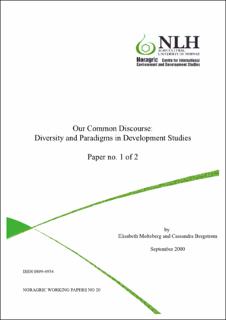| dc.contributor.author | Moltebrg, Elisabeth | |
| dc.contributor.author | Bergstrøm, Cassandra | |
| dc.date.accessioned | 2020-05-05T12:55:39Z | |
| dc.date.available | 2020-05-05T12:55:39Z | |
| dc.date.issued | 2000-09 | |
| dc.identifier.issn | 0809-4934 | |
| dc.identifier.uri | https://hdl.handle.net/11250/2653366 | |
| dc.description.abstract | This is the first of two papers that discuss challenges of power and communication in Development Studies. It is seen as an arena for scientific discourse, where representatives of a range of different perspectives and scientific disciplines address complex problems at the natural-social interface. Through integrating these contributions, Development Studies can make a valuable contribution to scientific theory and to understanding and acting on problems and processes addressed. This paper focuses on barriers to integration, which derive from inadequate ability among discourse contributors to communicate, particularly across disciplinary borders. The authors argue for a reflexive discourse. Contributors’ assumptions should be made explicit on practicalities, e.g. level of integration in any inter-disciplinary activity, and on basic paradigmatic assumptions. The authors suggest a middle ground between seemingly incommensurable positions on truth, reality, and knowledge, which may facilitate communication in the Development Studies discourse. | en_US |
| dc.language.iso | eng | en_US |
| dc.publisher | Norwegian University of Life Sciences, Ås | en_US |
| dc.relation.ispartofseries | Noragric Working Papers;20 | |
| dc.title | Our Common Discourse: Diversity and Paradigms in Development Studies. Paper no. 1 of 2 | en_US |
| dc.type | Working paper | en_US |
| dc.subject.nsi | VDP::Social science: 200::Political science and organizational theory: 240::International politics: 243 | en_US |
| dc.source.pagenumber | 36 | en_US |
